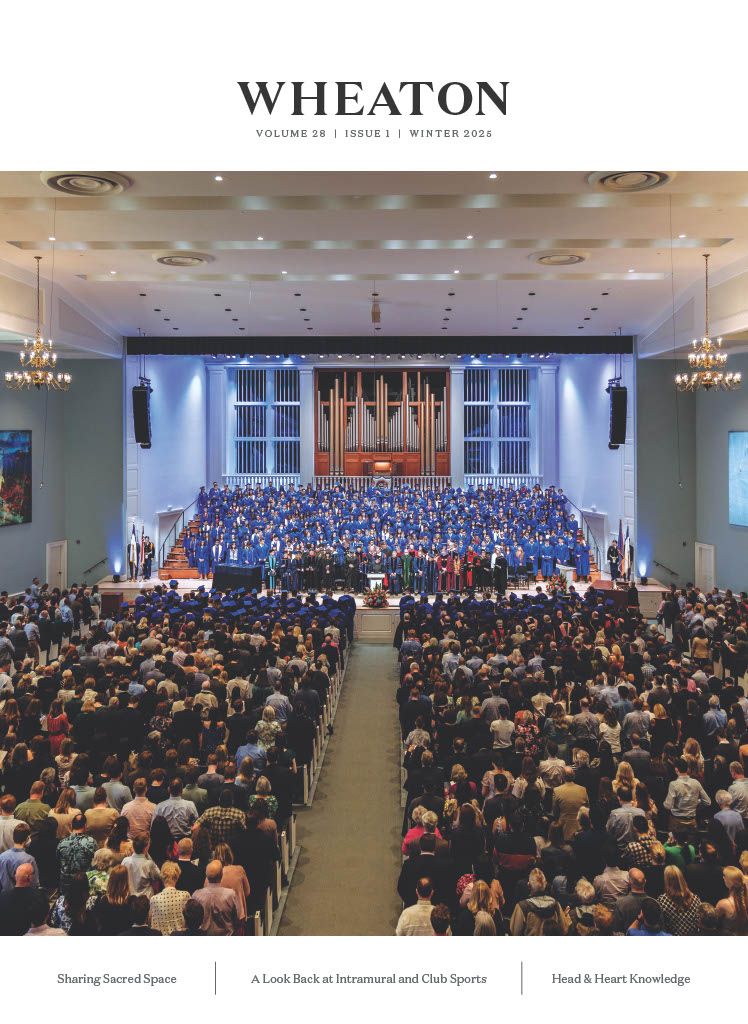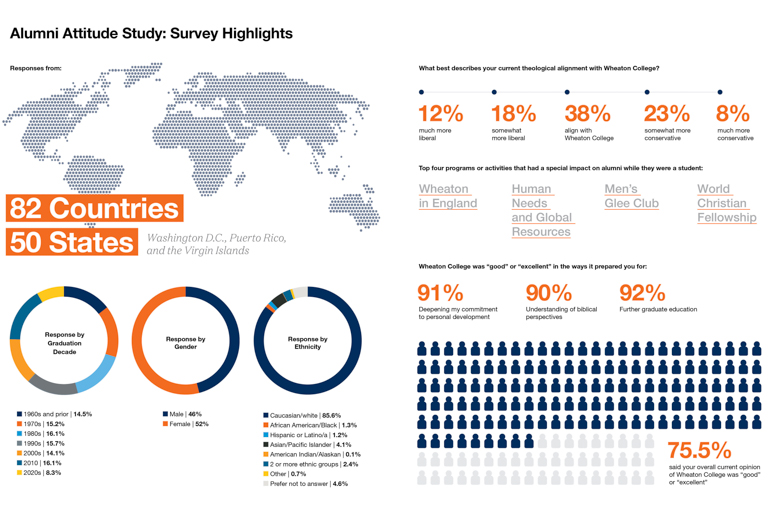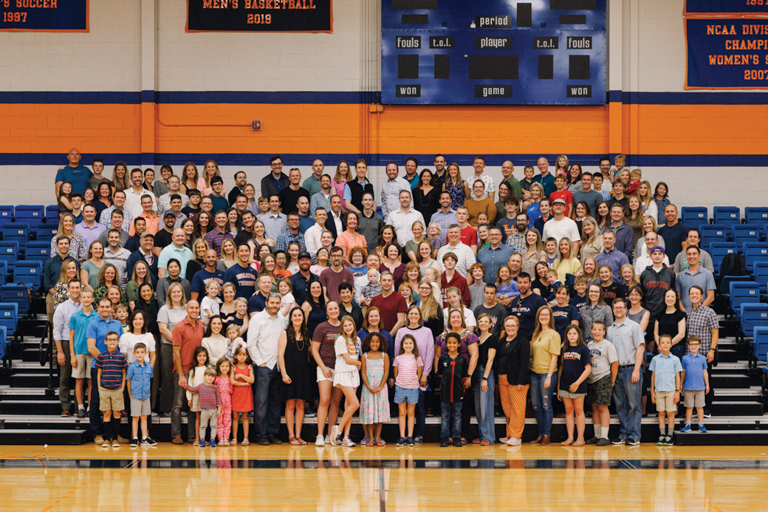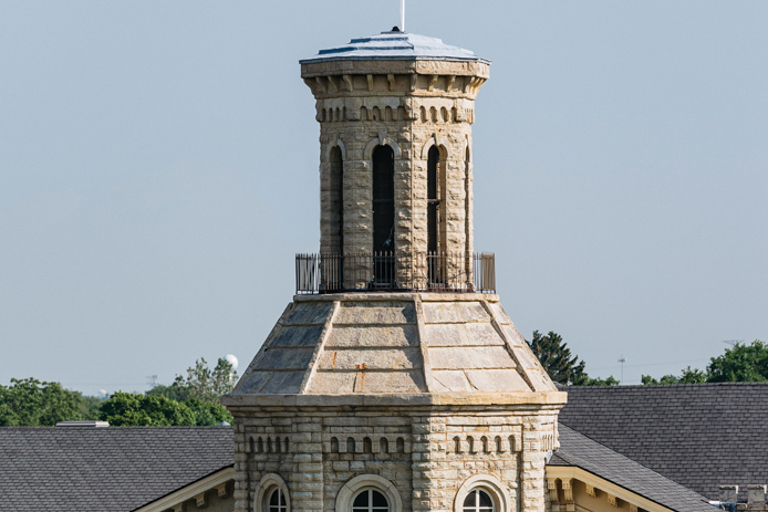Stewarding Wheaton College’s Evangelical History
For his wise stewardship of the Wheaton College Library’s Archives & Special Collections and his collaborative and peace-making leadership in crucial moments of institutional transition, the Wheaton College Alumni Association is pleased to honor Paul Ericksen M.A. ’82 with the 2024 Distinguished Service to Alma Mater Award.
Words: Liuan Chen Huska ’09
Photos: Ian Rempel
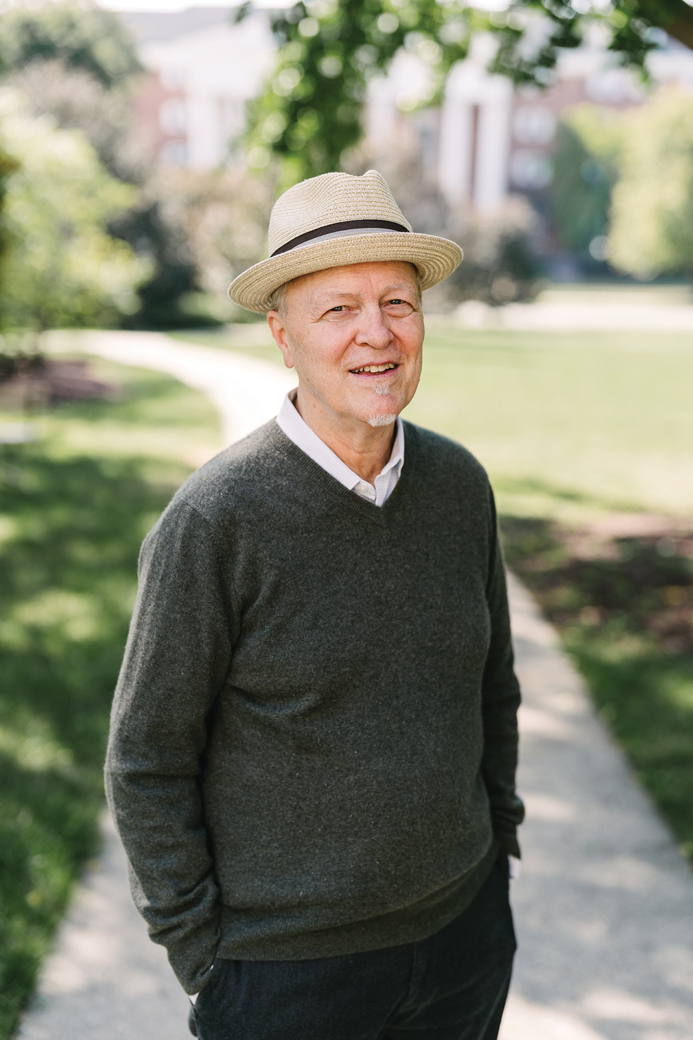
Paul Ericksen M.A. ’82
Wheaton College Alumnus of the Year for Distinguished Service to Alma Mater
Coming from missionary work in the Philippines, Paul Ericksen M.A. ’82 began his missions and intercultural studies graduate degree at Wheaton unsure what would come next. During the program, he took on an independent study project under then–department chair John Gration, researching the exit of China Inland Mission from China in the 1950s. At that point, Ericksen says, “I caught the archives and research bug.”Since then, Ericksen has worked in the College’s archives or library in many roles, including as Director of the Billy Graham Center Archives and Museum, Interim Director of the Wheaton College Billy Graham Center, and Interim Dean of Library and Archives.
BUILDING A UNIQUE CONNECTION
Ericksen likens archival work to doing a puzzle. “You figure out how the pieces work together, what factors contribute to a story, and try to make sense of missing information,” he said. “You track down information that might help fill gaps.”
Starting out as an assistant archivist in what is now the Evangelism and Missions Archives, Ericksen has arranged and described the papers of evangelists and organizations including Billy Graham ’43, Leighton Ford ’52, Luis Palau HON, and the International Fellowship of Evangelical Students.
“He has helped build a unique, world-class collection,” said fellow archivist Bob Shuster ’73. Shuster hired Ericksen upon his graduation and they’ve had adjacent offices for over four decades. Ericksen has persuaded individuals and groups to entrust their records to Wheaton, Shuster said, “by emphasizing the need for true history, the responsibility of the present generation to explain itself to future generations, and the need for an organization to be able to tell their own staff the origins and development of the organization—so that it could be told as part of the larger history of the church.”
The Evangelism and Missions Archives are used by students, faculty, the general public, and scholars from around the world. This on-campus archival work, along with the College Archives & Special Collections, supports Wheaton’s task of training students as gospel-centered leaders in society and participants in the church. “We try to facilitate an understanding of a particular slice of evangelical history,” Ericksen said. “It helps reinforce the College’s commitment to evangelism and missions.”
It takes meticulous work to get to the point where people can use a collection in the Manuscripts Reading Room on the third floor of Billy Graham Hall. For instance, in 1988–1989 the College received over 400 boxes of materials from InterVarsity Christian Fellowship. From there, Ericksen and his colleagues wrote descriptions of the correspondence, reports, and other administrative files to facilitate researchers’s access to the records. They ordered them in a way that continues to be accessible to the organizations who provided the material as well as to researchers.
Ericksen has seen the collections through multiple technology shifts, including DECmate computers, dot matrix printers, and converting microfiche to CDs to digital files. Now all the archival “finding aids”—the descriptive materials that allow researchers to decide what boxes or folders to request from the collection—are available online.
Numerous research projects and books have been possible through the upkeep of these collections, such as Lucy Austen’s recently published biography of Elisabeth Elliot (Crossway, 2023), Edith Blumhofer’s Songs I Love to Sing: The Billy Graham Crusades and the Shaping of Modern Worship (Eerdmans, 2023), and David Swartz’s Facing West: American Evangelicals in an Age of World Christianity (Oxford, 2020).
FINDING THE HUMAN VOICES
When someone arrives in the Reading Room, whether an undergraduate student just starting out in serious archival research, a curious visitor, or a visiting scholar working on a book or dissertation, Ericksen has often been the friendly and encouraging first face they encounter, helping them find what they’re looking for. Lisa Richmond, former Dean of Library and Archives, supervised Ericksen when the Evangelism and Missions Archives transitioned from the Billy Graham Center to become part of the library. “Scholars would regularly comment on how astonished and grateful they were for the quality of assistance they received,” said Richmond, who is now vice president of research at the nonpartisan Canadian think tank Cardus. “Many of these scholars would thank Paul by name in the acknowledgments section of the books they published.”
Ericksen also taught classes orienting students to the Archives and hosted annual lectures where scholars presented on research that drew from the collections. “Thousands of people have come to Wheaton from all over the world to use those collections,” Shuster said. “The fact that Wheaton has this collection has been the deciding factor for some students who enrolled in the College.”
Ericksen continues as an archivist today in Archives & Special Collections, where he also gets to work on oral histories several times a year. He recently traveled to Charlotte, North Carolina, to conduct multiple days of interviews with Leighton Ford ’52, the brother-in-law of Billy Graham ’43. They covered Ford’s work with the Billy Graham Evangelistic Association, leading the Lausanne global missions movement, and other key moments in Ford’s life.
Ericksen sees helping people tell their stories as a fun part of his work. “It’s challenging trying to be ready to know what questions to ask, and there are always more questions than there’s time to ask—things that come up in the course of the conversation that pose new questions,” he said. After the interviews, he and his teammates spend hours transcribing each recording.
Ericksen has also interviewed John Perkins HON; Rene Padilla ’57, M.A. ’60; David Howard ’49, M.A. ’52; SIM Director Ian Hay, and many other grassroots missionaries.
“The work of an archivist can be tedious, repetitive, and dusty,” said Katherine Graber M.A. ’12, M.A. ’20, Team Leader for Archives & Special Collections. “But Paul consistently finds the human voices and unique stories within the mountains of paper.”
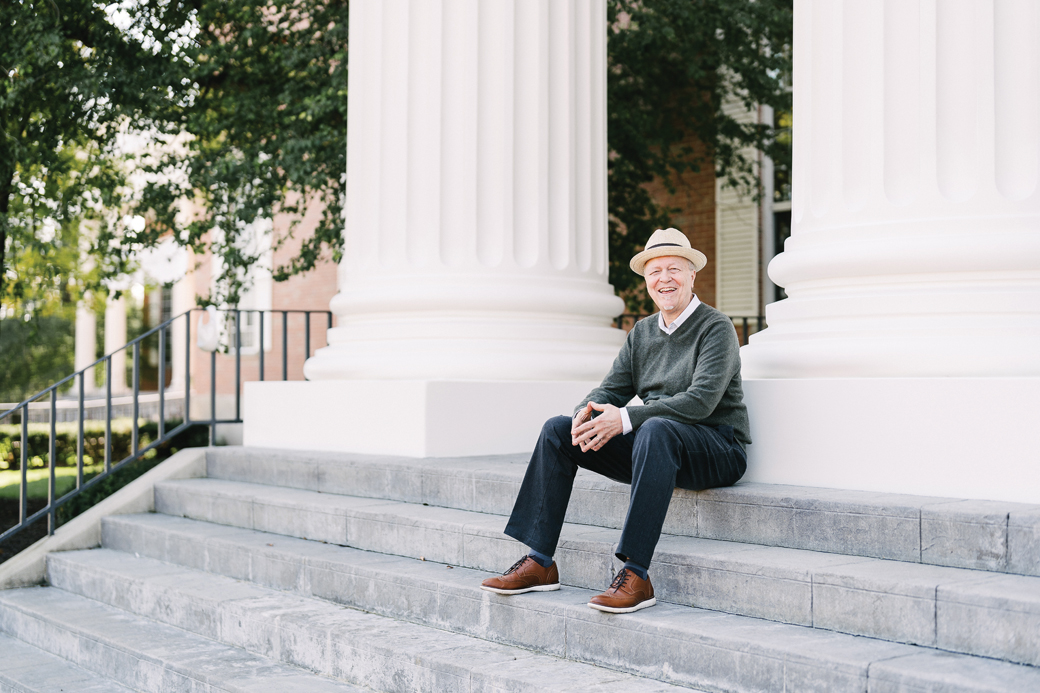
Paul Ericksen on the steps of Billy Graham Hall, Wheaton College.
WEARING MULTIPLE HATS
In 2002, Ericksen became Director of the Billy Graham Center Archives and two years later also took over directing the Billy Graham Center Museum. In this role, he helped organize exhibits such as Tim Botts’ calligraphic interpretations of biblical themes, He Qi’s East-West blend of Christian art, and Japanese printmaker Sadao Watanabe’s pieces. “It was a lot of work, but it was very invigorating,” Ericksen said.
During that time, Ericksen was mentored by then-director of the Billy Graham Center Lon Allison. “Lon was always the one telling me, ‘Why don’t you try this?’” Ericksen said. “He was always encouraging me to step more into my role with leadership and responsibility.”
Upon Allison’s resignation in 2013, Ericksen stepped in as interim director amid uncertainties about the BGC’s future. He served in the role until a permanent director was hired in 2016. “He provided strong leadership during a difficult time when the institution needed leadership and encouragement,” said Shuster.
When Richmond took another role in 2019, Ericksen stepped in as interim dean. COVID-19 hit soon after, as well as the first round of academic reprioritizations at the College. According to Provost Karen An-hwei Lee, Ericksen’s leadership was stabilizing in a tumultuous time. “His pastoral, peace-making leadership style meant long hours dedicated to praying with his faculty and staff colleagues,” Lee said. “He did so with joyful and patient dignity.”
Ericksen and his colleagues now joke about his role as “professional interim.” He never intended to fill these positions permanently, believing they required more professional training and administrative experience than he felt he had or wanted to pursue. Humbly, he relied on his colleagues’s expertise, collaboration, and his own project management skills to fill the gaps in leadership until they could hire the right candidate.
“The one thing I learned being the interim dean of library and archives was I didn’t have to completely learn to be the dean,” Ericksen said. “Instead, I needed to lean on the people I worked with in the library just to navigate all of the issues the library deals with, like solving for user access and making sure we’re taking good care of our students and employees.”
Ericksen’s leadership style is relational and collaborative, according to Graber. “He is an excellent mentor, encouraging his direct reports to explore possibilities and projects that excite them and develop their gifts and skill sets,” she said. “Paul is the first to ask his teammates for life updates as well as project updates.” Being part of a team that enjoys each other as well as their work is a feature Ericksen has cultivated over the years.
When the College found a permanent dean of library and archives in 2021, Ericksen returned to his hands-on role as an archivist.
STILL HAVING FUN
Today, Ericksen works four days a week in Archives & Special Collections, helping researchers find materials in the Reading Room on Thursday afternoons and Friday mornings.
Recently, Ericksen brought two of his grandchildren down to the Archives’ basement storage to meet “Mr. Chalmers,” a life-size figure, one of two created by liturgical artist Marjorie Nystrom Gieser ’59 for trustee emeritus Bill Pollard ’60. The Archives had received some art pieces from Pollard’s collection, and when asked if they would also like the male figure, Ericksen replied, “Absolutely.”
“His colleagues are also grateful for the humor he brings to the office and his love of pranks,” Graber said. “No new Archives & Special Collections employee escapes the onboarding process without an introduction to Mr. Chalmers.”
Reflecting on 42 years of working alongside Ericksen, Shuster recalls sharing each day’s work, problems, opportunities, surprises, and disappointments all with Ericksen’s running commentary and wry comments. To Shuster, Ericksen embodies the spirit of this DSTAM award: “Paul has been an example of a person who loves Jesus Christ and applies his faith to his vocation and his life,” Shuster said.
Ericksen looks back on the many who mentored and influenced him leading up to and during his studies and career at Wheaton, including Lisa Espineli Chinn M.A. ’72—his supervisor at InterVarsity Christian Fellowship of the Philippines—and former Provosts Stan Jones hon and Margaret Diddams ’83. “I’ve been really fortunate and blessed to work at Wheaton,” Ericksen said. “Wheaton has given me a way to live out what I have found to be the things I love doing, am equipped to do, and contribute to the global effort to better understand and facilitate the spread of the gospel.”
Outside of work, Ericksen spends time with his wife, Phyllis M.A. ’05; their three sons; and nine grandchildren. He reads award-winning children’s books, leads his church’s young children in their worship, enjoys jazz recordings and concerts, cooks Sunday dinners, and solves jigsaw puzzles of fine art, like a 1,000-piece puzzle of a Jackson Pollock painting.
Ericksen turned 70 this year. People sometimes ask if he’s ready to retire yet. He replies, “I’m still having fun.”
